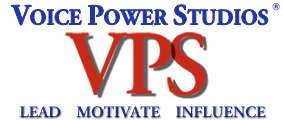Maybe it’s because I’m a singer that I just naturally know that one’s voice has an intrinsic, almost automatic relationship to happiness. Singing brings me untold joy. And connection—to myself and to others. And it’s not just based on my own personal feeling or intuition. Over the last 20 years, researchers and study after study have shown that singing—
Call: 505-466-6500
Voice Power Studios Blog
Why doesn’t anybody seem to realize the importance of this secret, not even executive leadership and sales programs.
Here’s the reality....
It does not matter what product or service you offer or whether it is in person, on video or online.
If you want to be a successful executive or entrepreneur that consistently delivers quality leadership and large profits…
If you want to build a team and/or a customer base that will stay loyal to you…
If you want to convert your leads to customers, clients or patients…
If you want to communicate effectively with any size group of prospects…
I am amazed at how many people don’t understand that the sound of their voice is directly connected to their success in life.
“The voice is the megaphone of the soul”, said ancient sages. Voice Power Studios’ translation, “The Voice is the megaphone of your Personal Power."
"It took me quite a long time to develop a voice and now that I have it I am not going to be silent.” Madelaine Albright, US Secretary of State.
When speaking professionally or personally, there are three voice skills that you need to project your Personal Power and communicate effectively.
Othman Ouenes is one of those foresighted tech entrepreneurs who not only realized early on how critical one’s speaking voice is to one’s business-world success, he also believes even more firmly that the way you speak is vitally important to the success of a startup. (And beyond that, to one’s interpersonal relationships—and even to oneself—as well.)
And just as critical to the success of these startup businesses—having already guided one startup to success, he’s now into his second digital startup, Fidari, a healthcare platform for cancer patients. Here he talks about his path from non-native English speaker to Stanford graduate to startup wunderkind—and how crucial his speaking voice has been all along the way.
Kyle Forster is intimately familiar with tech startups—and the importance of one’s speaking voice to the success of a startup, of a career in tech, in business, in board rooms, in pitches to venture capitalists, investors, potential shareholders, and just as critically: to the people on the startup team.





